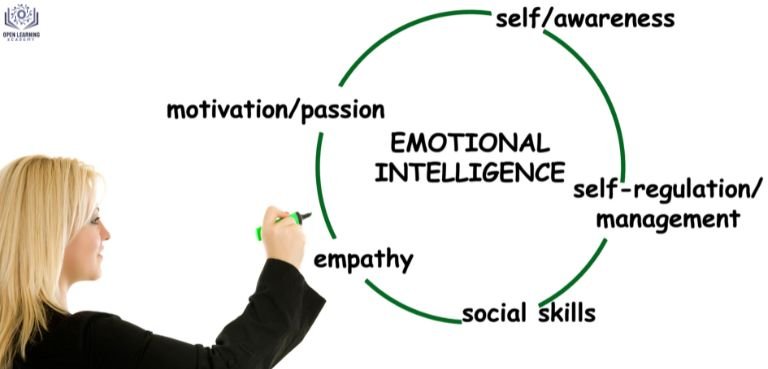Have you ever stopped to think about how some people seem to manage their emotions better than others? They know how to stay calm in stressful situations, connect with others in a meaningful way, and understand their own feelings deeply. This ability to navigate emotions, both your own and others, is called emotional intelligence (EQ). But what are the main keys of emotional intelligence, and how can they benefit you? In this blog, we’ll explore the five most important components of emotional intelligence.
What is Emotional Intelligence?
Emotional intelligence is the ability to recognise and understand your own emotions, as well as those of others, and use this awareness to guide your actions. It’s more than just being aware of your feelings; in fact, it’s about understanding how emotions influence behaviour. As a result, people with high emotional intelligence are better at managing stress, resolving conflicts, and building strong relationships because they know how to navigate emotions effectively.

What Are the 5 Keys of Emotional Intelligence?
Here are the 5 keys of emotional intelligence:
Self-Awareness
Self-awareness is the foundation of emotional intelligence. It means being able to recognise and understand your own feelings. When you’re self-aware, you can easily identify what you’re feeling, why you’re feeling it, and how it affects your thoughts and actions.
For example, after a long day at work, you might feel frustrated. Instead of getting angry with someone or keeping those feelings inside, self-awareness helps you recognise that frustration. As a result, you can choose a healthier way to handle it, like taking a break, talking to a friend, or finding another way to relax. Self-awareness is the foundation of emotional intelligence
How to improve self-awareness:
- Take time to reflect on your emotions regularly. Journaling can help you identify patterns in your emotional responses.
- Practice mindfulness to become more aware of your feelings in the present moment.
- Ask for feedback from others to gain a better understanding of how your emotions affect your behaviour.
Self-Regulation
Self-regulation is closely related to self-awareness. In fact, it refers to your ability to control your emotions and behaviour, particularly in difficult situations. When you can self-regulate, you don’t let your emotions dictate your actions. Instead, you can pause, think, and choose a response that aligns with your values and goals.
For example, if someone criticises your work, rather than getting defensive or angry, self-regulation allows you to take a deep breath, listen to the feedback, and respond calmly. As a result, you handle the situation more thoughtfully and with greater control over your emotions.
How to improve self-regulation:
- Practice deep breathing or other relaxation techniques to manage stress and calm your emotions.
- Set personal goals and monitor your progress to stay motivated and focused.
When you feel a strong emotion rising, take a moment to pause before reacting.
Motivation
Motivation is the inner drive that pushes you to achieve your goals, not because of rewards or recognition but because of a deeper sense of purpose and satisfaction. People with high emotional intelligence are often motivated by personal growth and the desire to make a difference rather than seeking approval or external rewards.
Furthermore, having motivation means maintaining a positive mindset and the determination to keep going, even when faced with obstacles. It’s what helps you stay focused and committed to long-term goals, even when progress seems slow, or challenges arise. As a result, with strong motivation, you’re more likely to stay on track and overcome difficulties along the way.
How to improve motivation:
- Focus on the reasons behind your goals and remind yourself of the bigger picture.
- Celebrate small wins along the way to stay motivated.
- Surround yourself with positive influences who encourage you to keep going.

Empathy
Empathy is the ability to understand and share the feelings of others. It goes beyond just recognising someone’s emotions; it’s about truly connecting with them on an emotional level. People with high emotional intelligence are good at picking up on subtle cues like body language or tone of voice. This helps them respond in a way that feels right for the situation.
When a friend is going through a tough time, empathy allows you to notice their distress and offer the support they need, whether it’s through a kind word, listening attentively, or offering practical help. By doing so, you provide meaningful support that can make a real difference in their day.
- Make a conscious effort to listen to others without judgement or interruption.
- Put yourself in others’ shoes by imagining how they might be feeling in a given situation.
- Show genuine interest in others’ lives and ask questions to learn more about them.
Social Skills
Social skills are the ability to build and maintain healthy relationships. They involve effective communication and conflict resolution. People with strong social skills know how to interact well with others, whether in groups or one-on-one and handle conflicts in ways that keep relationships positive.
In the workplace, these skills are essential for teamwork and collaboration. By communicating clearly, listening actively, and working well with others, you can create a positive environment. As a result, these skills help foster successful outcomes and smooth interactions within teams.
- Work on improving your communication skills, such as active listening and giving feedback.
- Be open to feedback from others and use it to improve your interactions.
- Practice conflict resolution by staying calm and seeking a win-win solution.
Conclusion
The five keys to emotional intelligence—self-awareness, self-regulation, motivation, empathy, and social skills—are crucial for both personal and professional success. By developing these skills, you can manage emotions more effectively, build stronger relationships, and achieve your goals. Although emotional intelligence doesn’t develop overnight, with practice and patience, you can significantly improve your EQ. As a result, you’ll see positive changes in various aspects of your life. Start working on these keys today, and watch how they improve your overall well-being and success.
Master emotional intelligence with Open Learning Academy’s Emotional Intelligence Course—develop self-awareness, empathy, and social skills to enhance your personal and professional life.

